
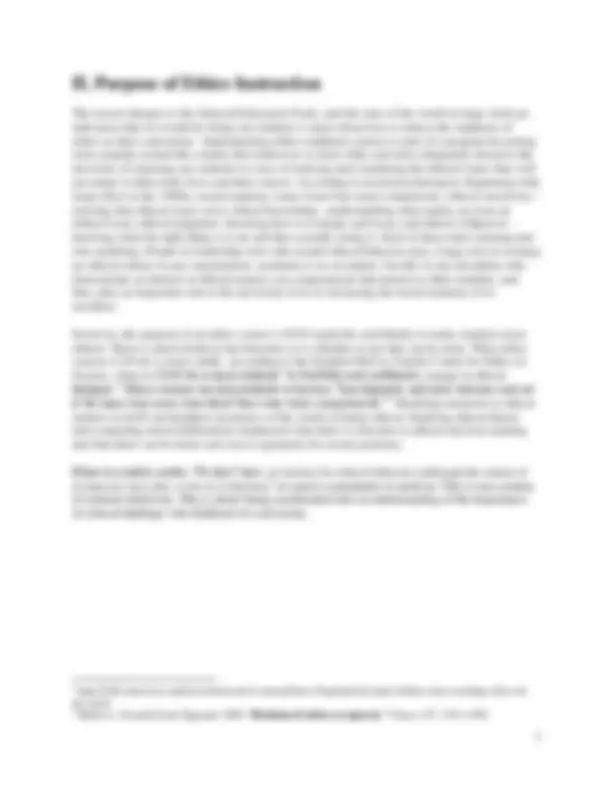
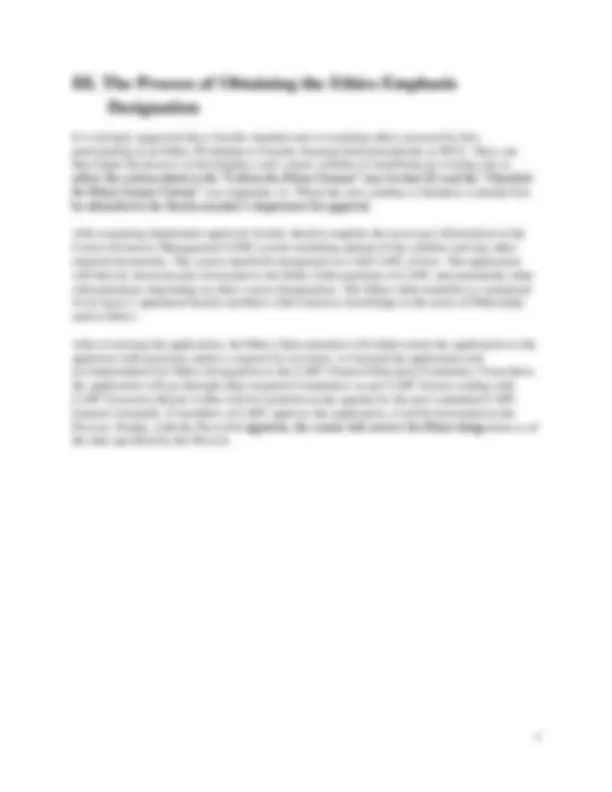
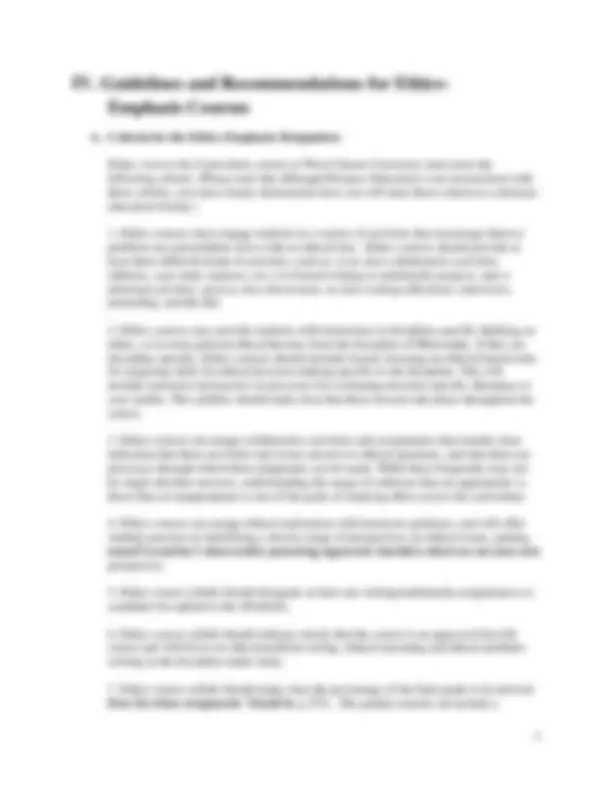
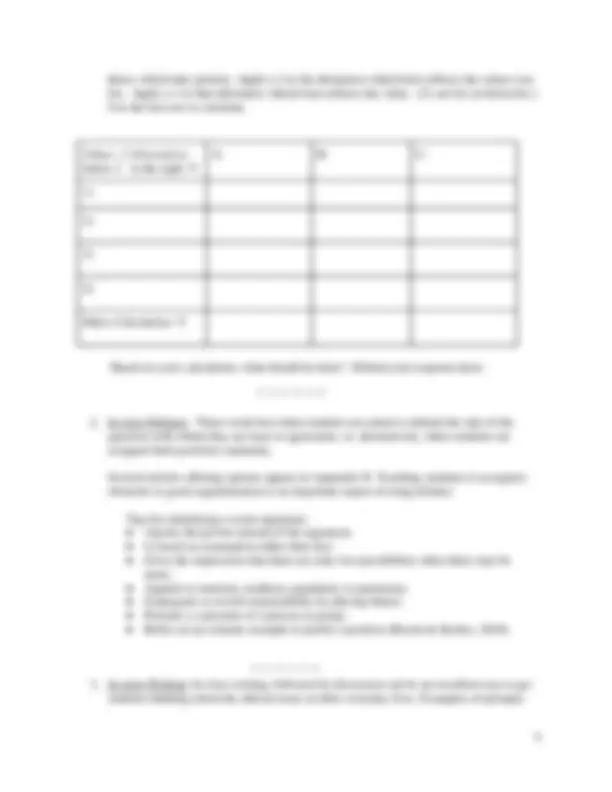
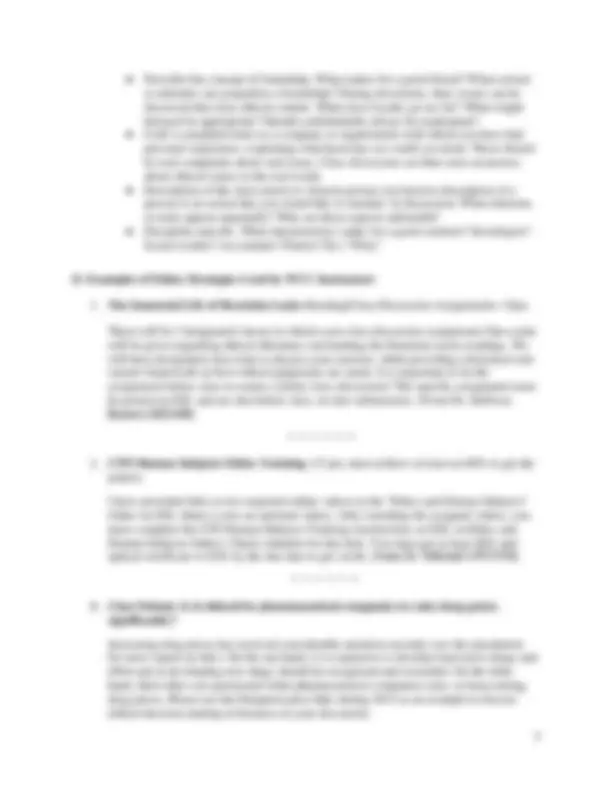
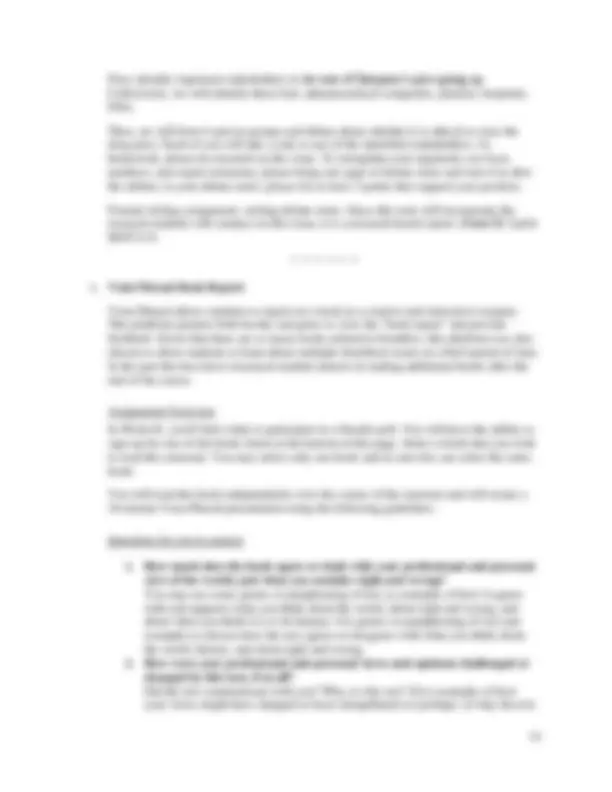
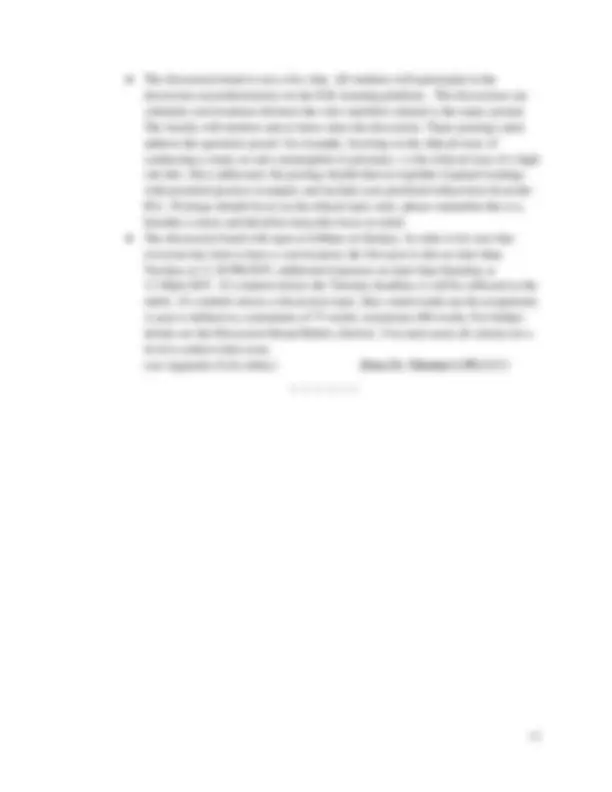

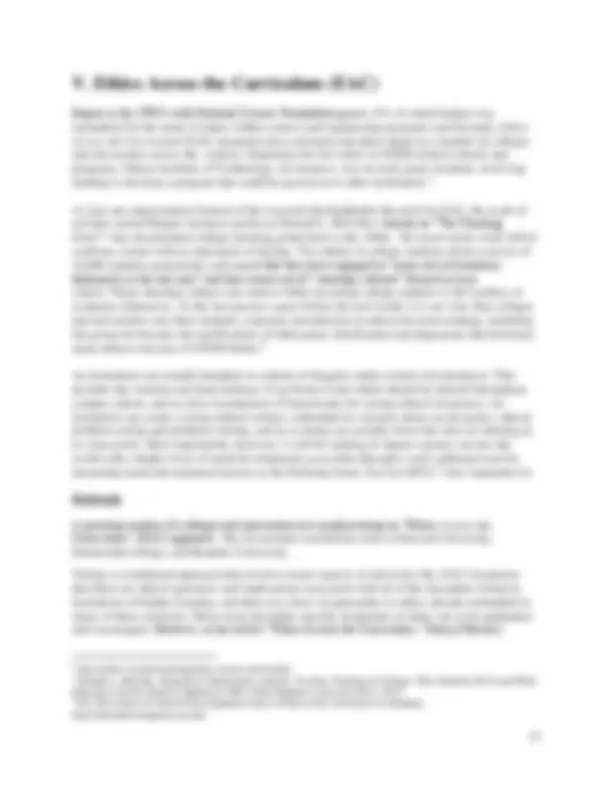
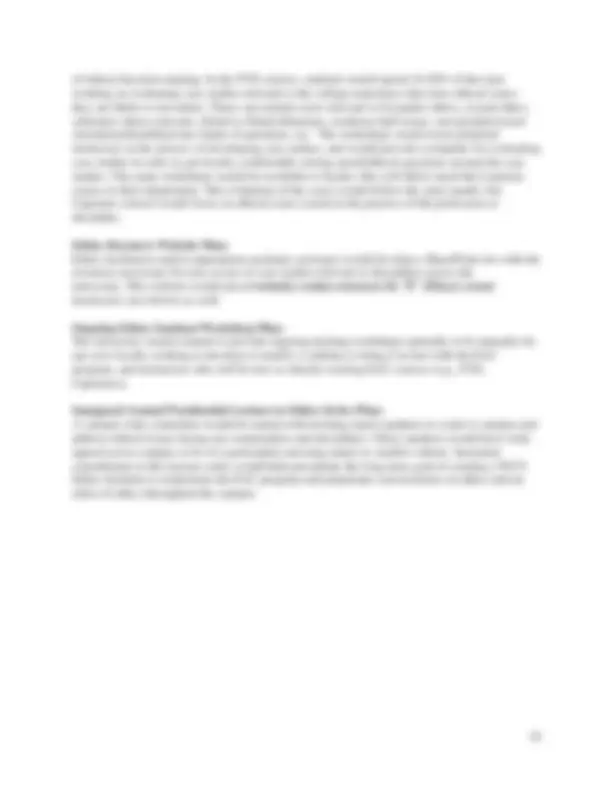
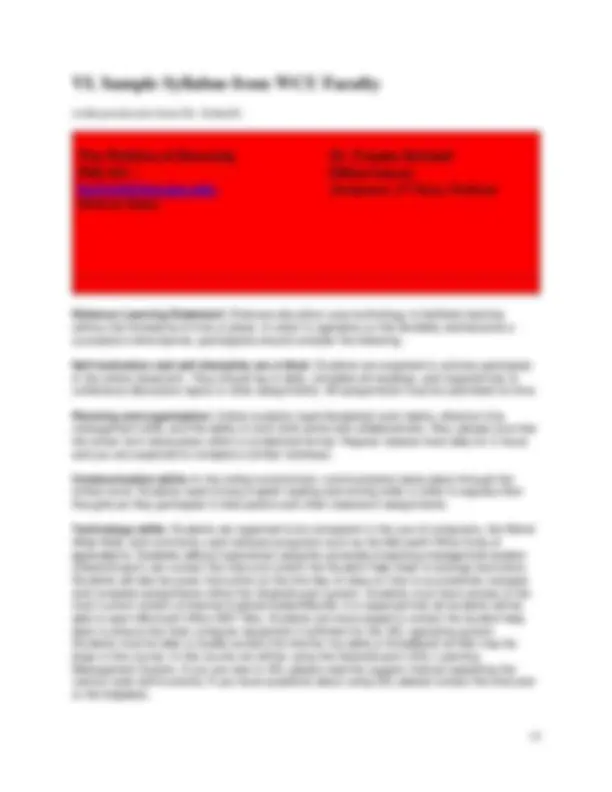
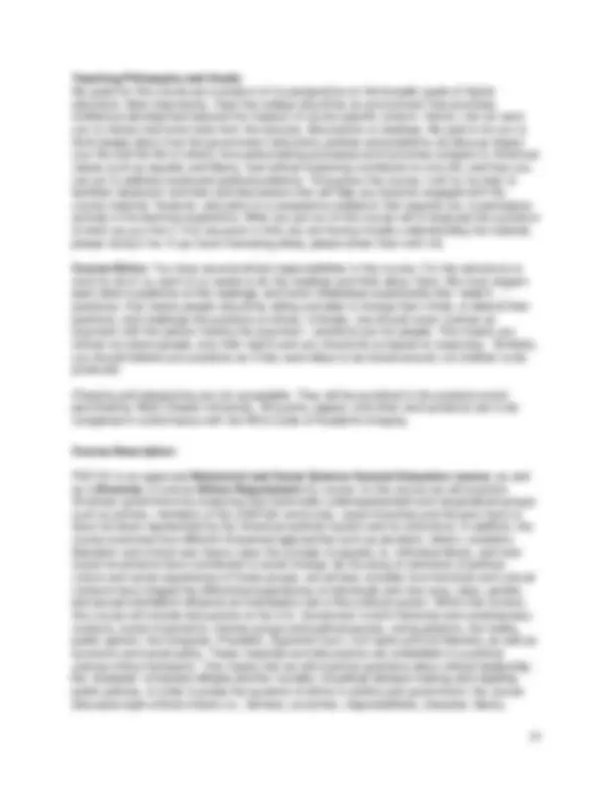
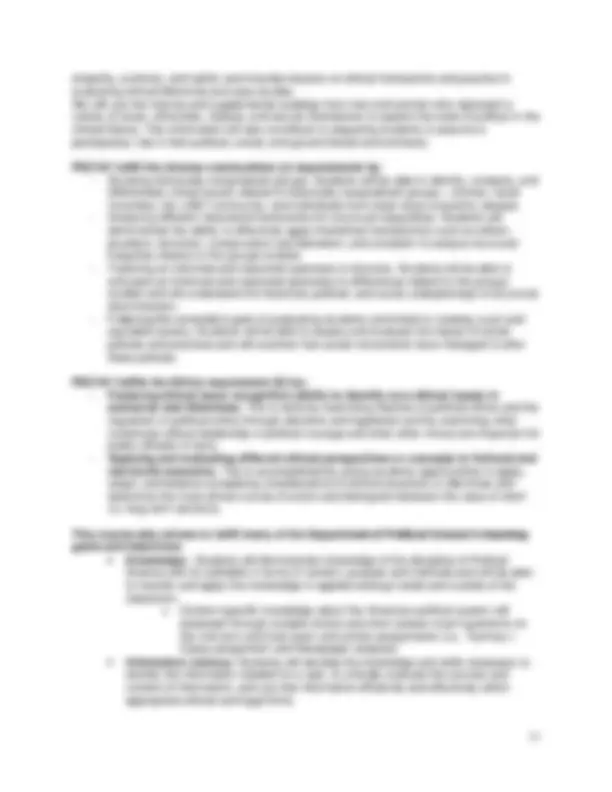
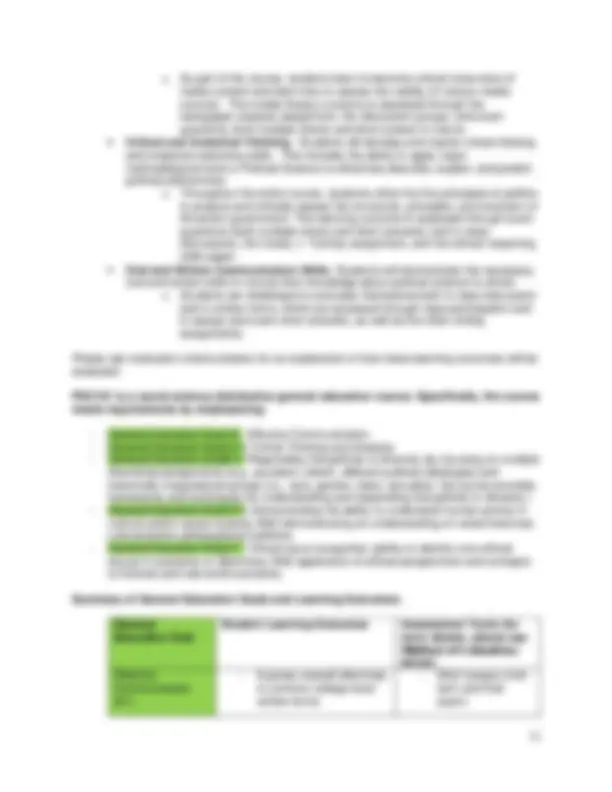
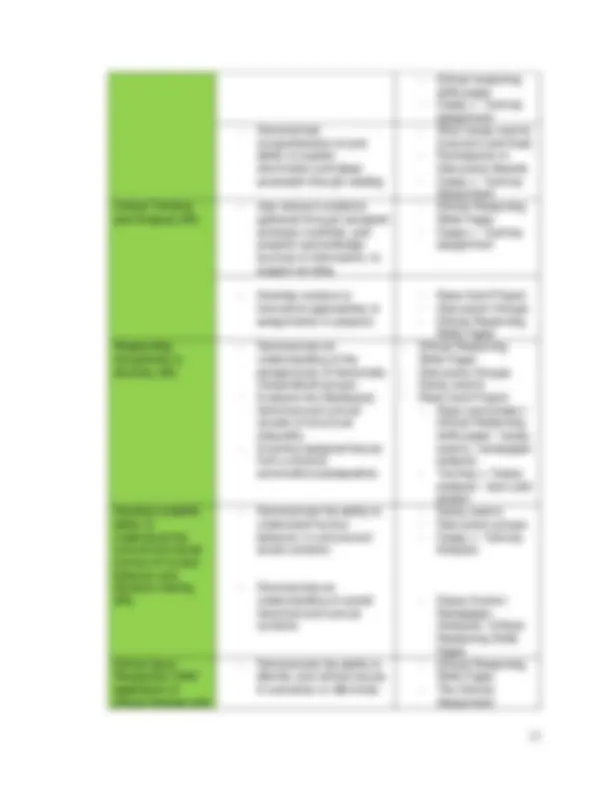
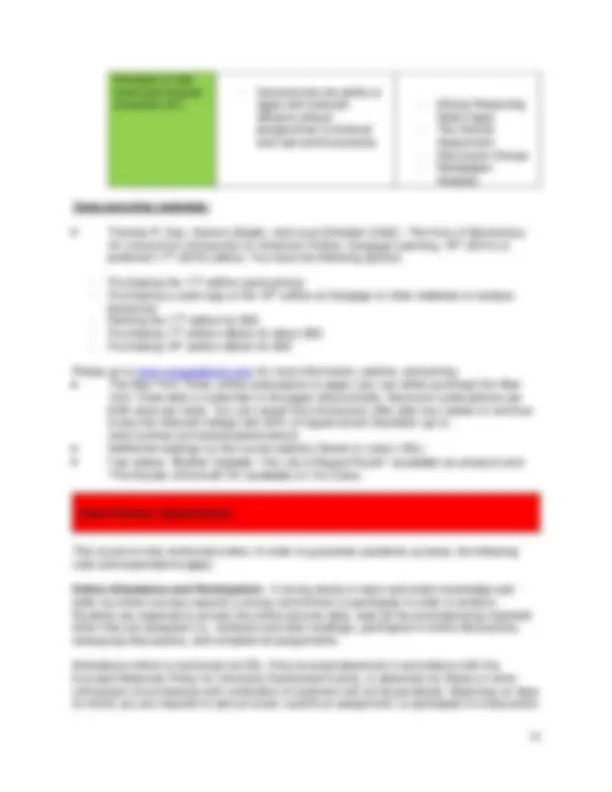
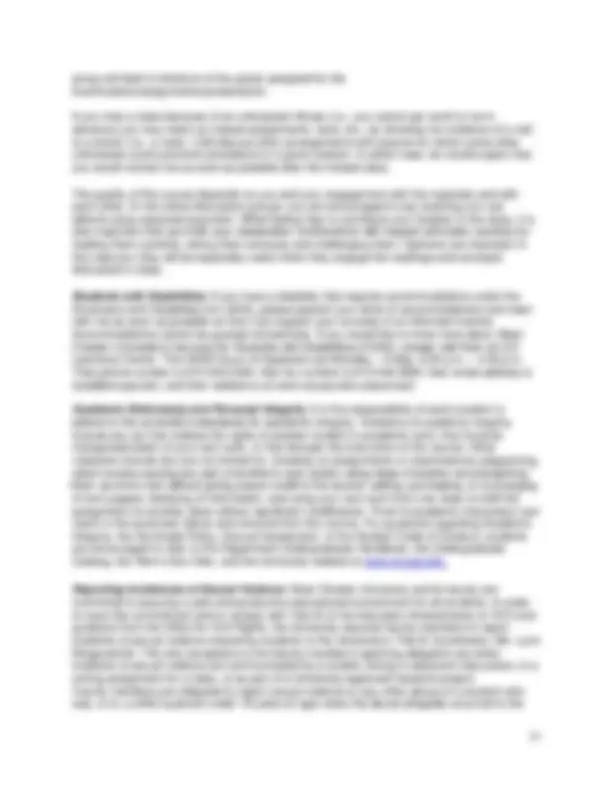
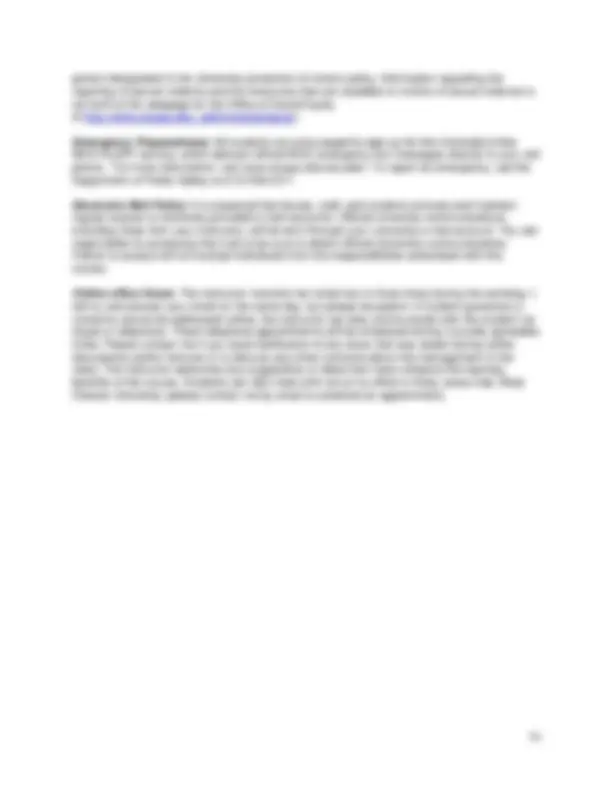
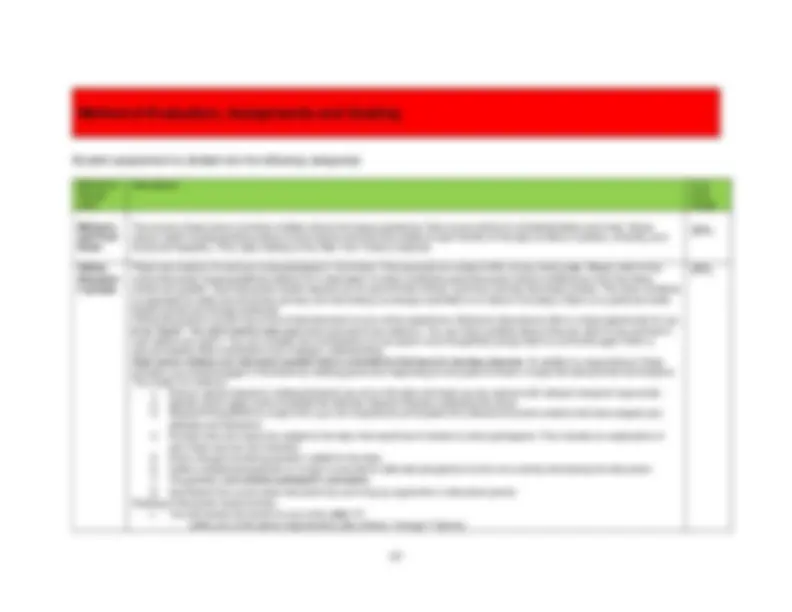
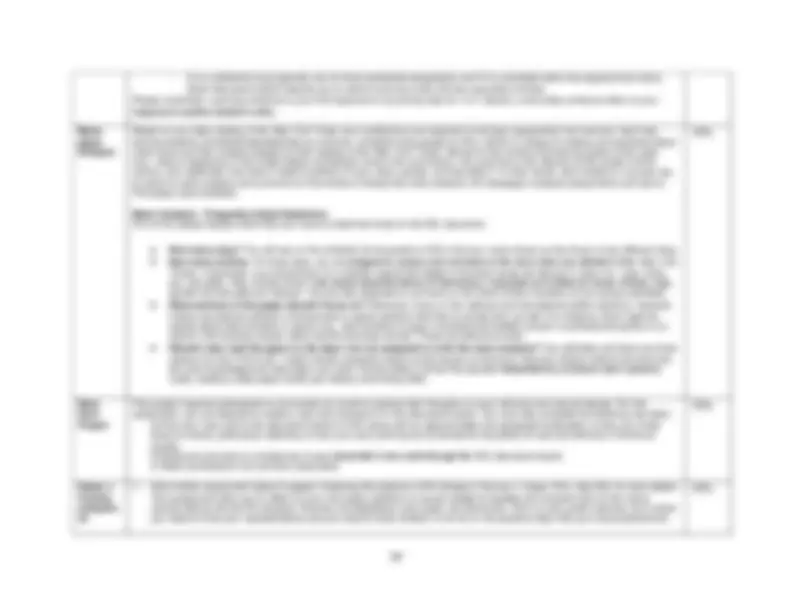
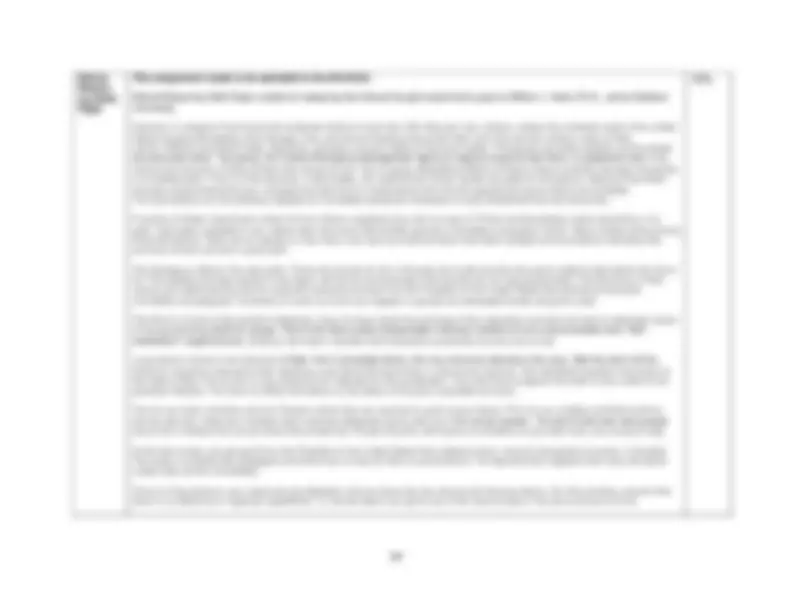
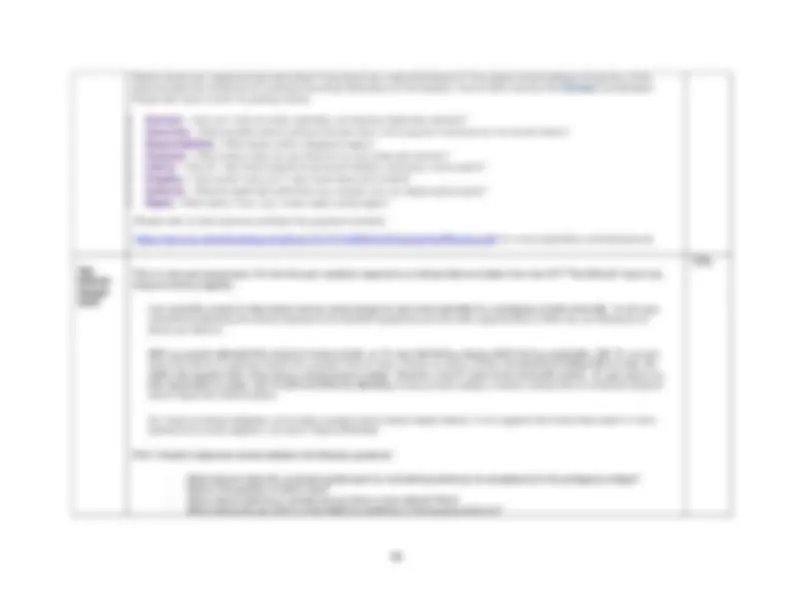
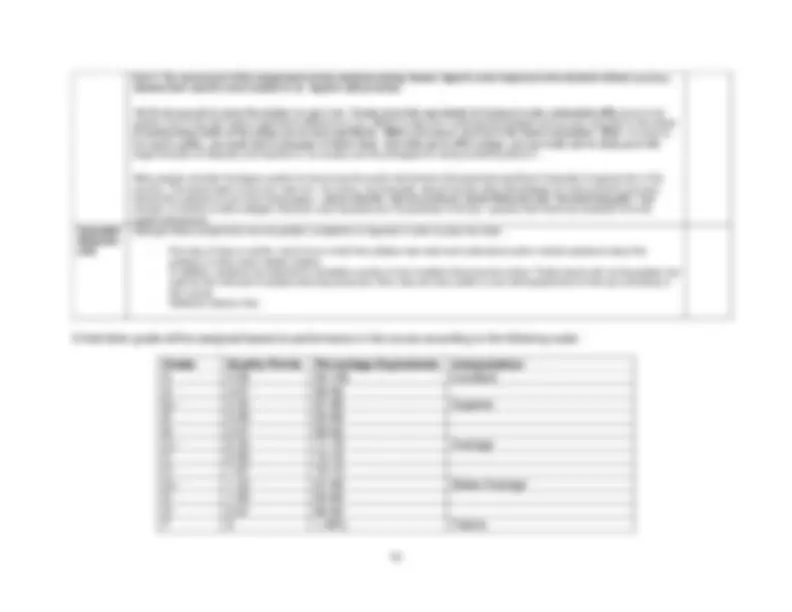
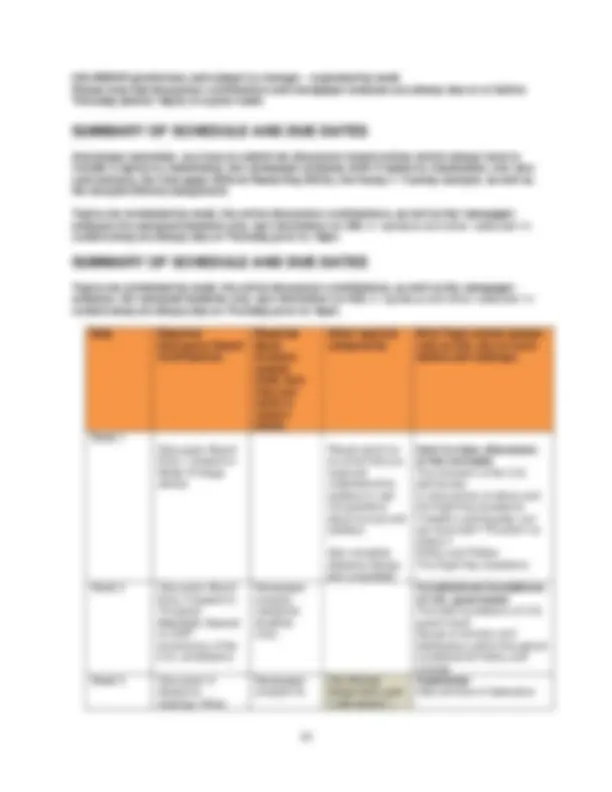
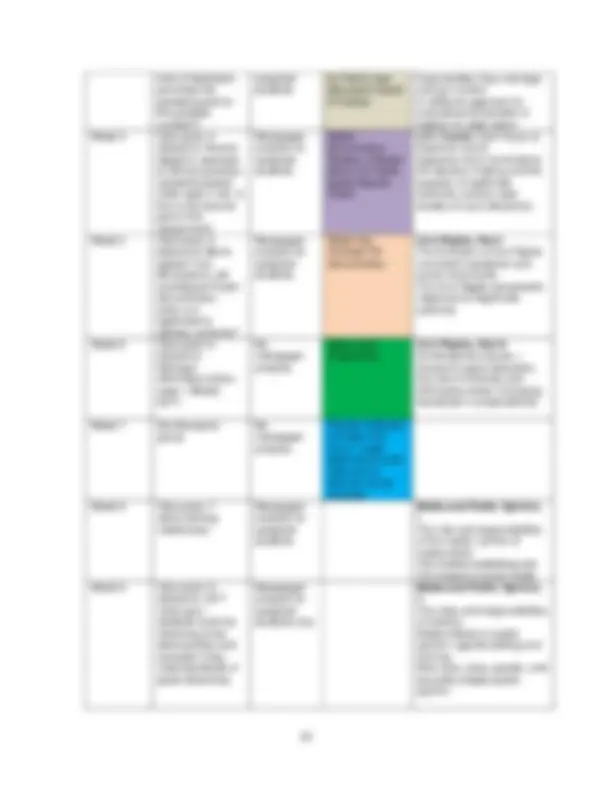
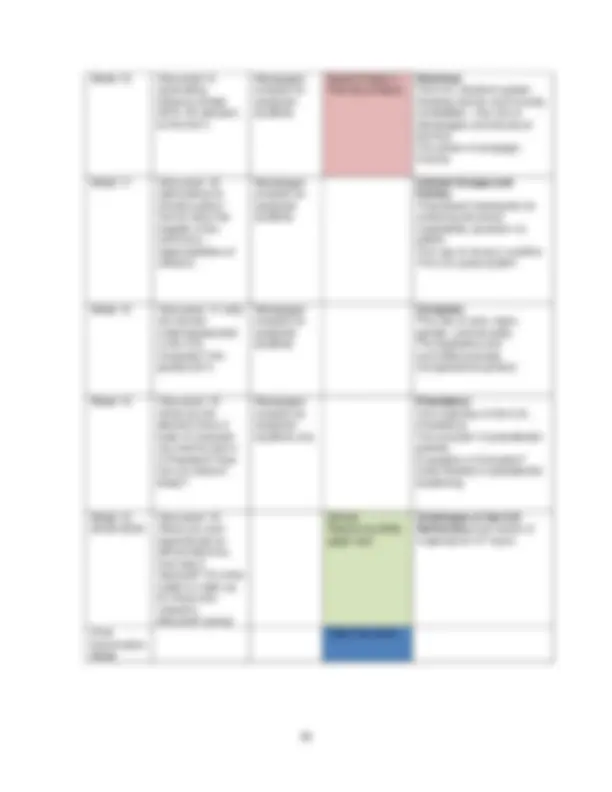
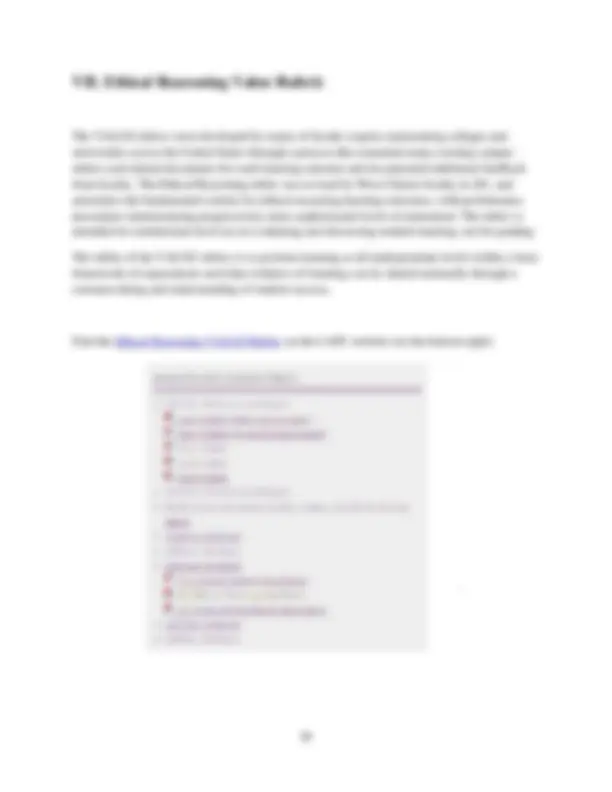
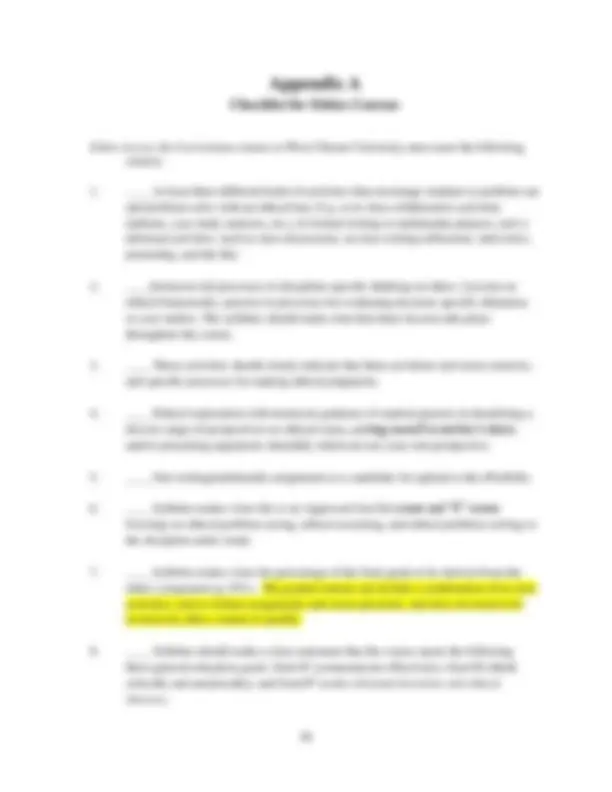
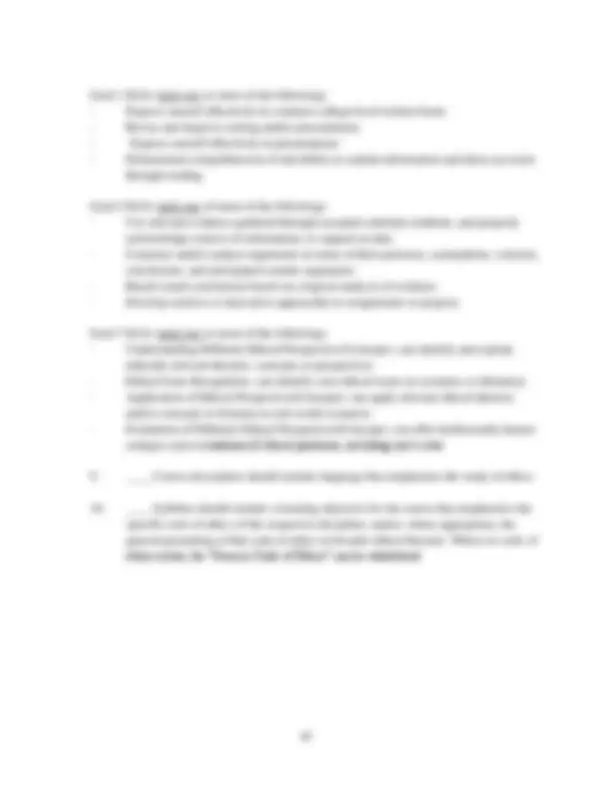
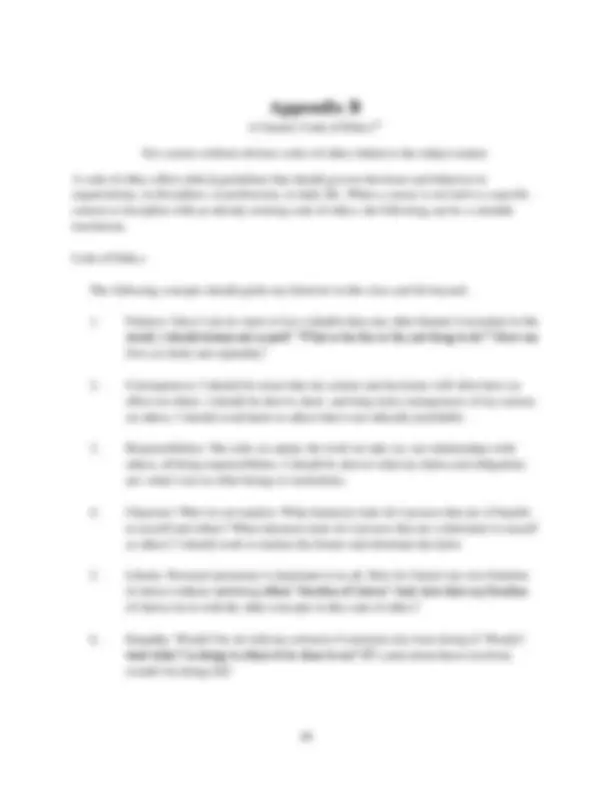
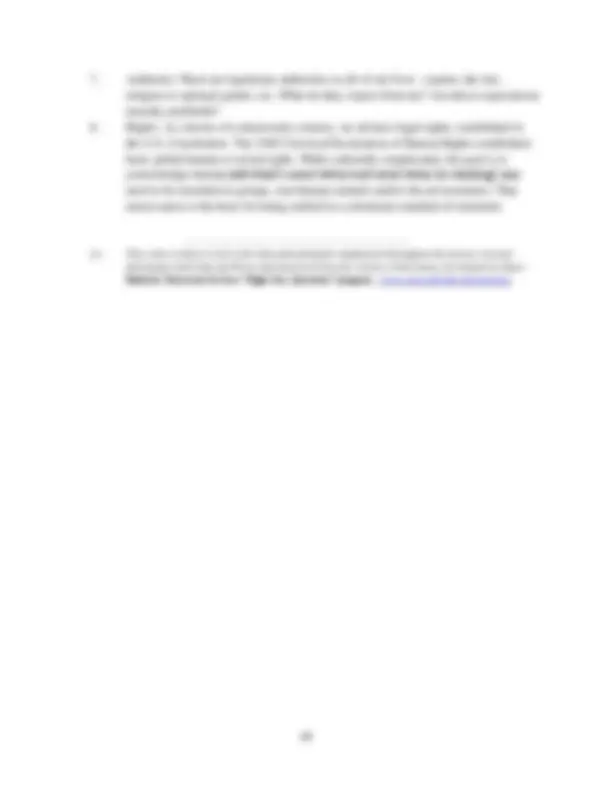
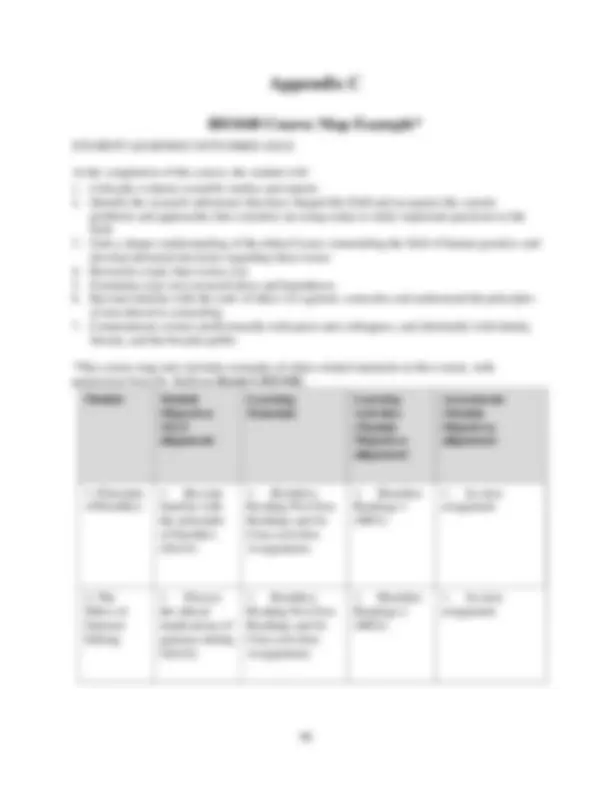
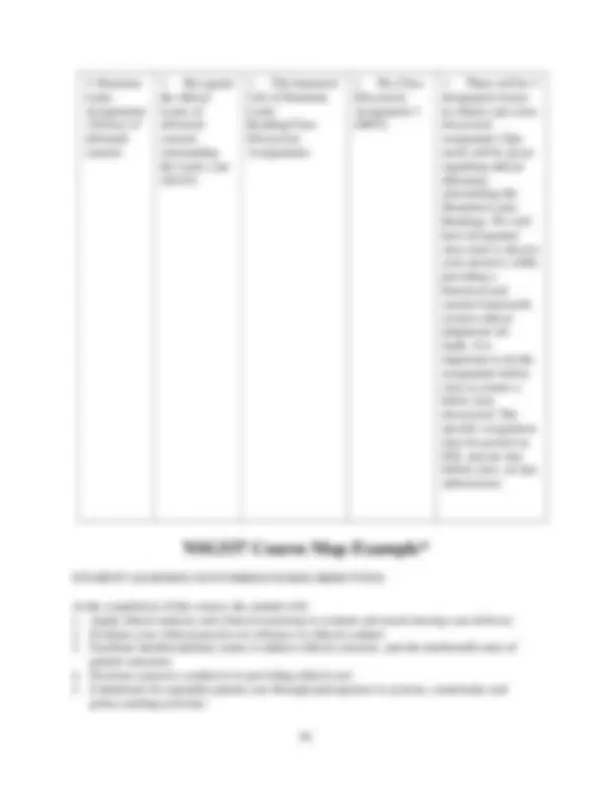
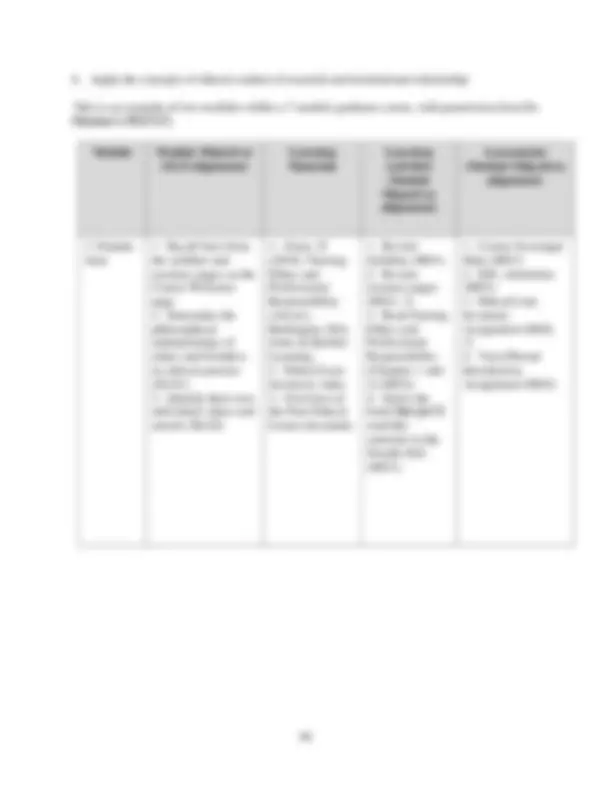
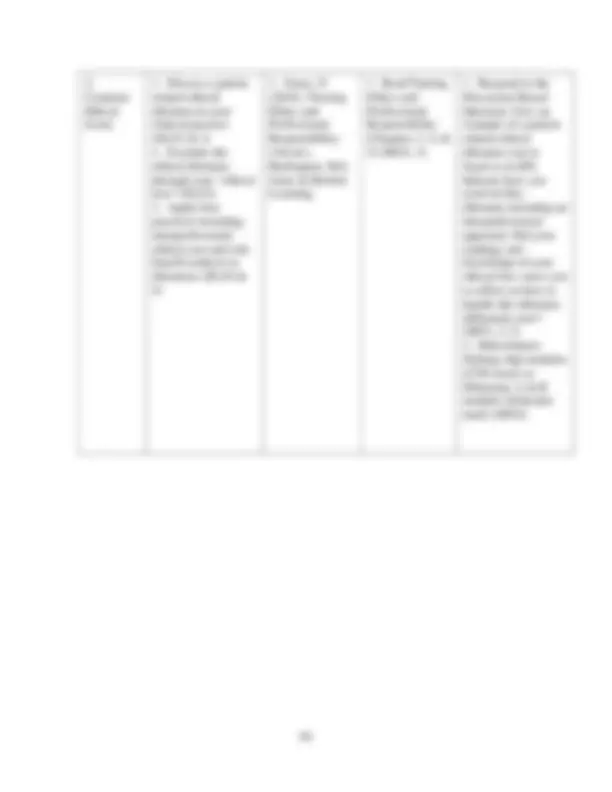
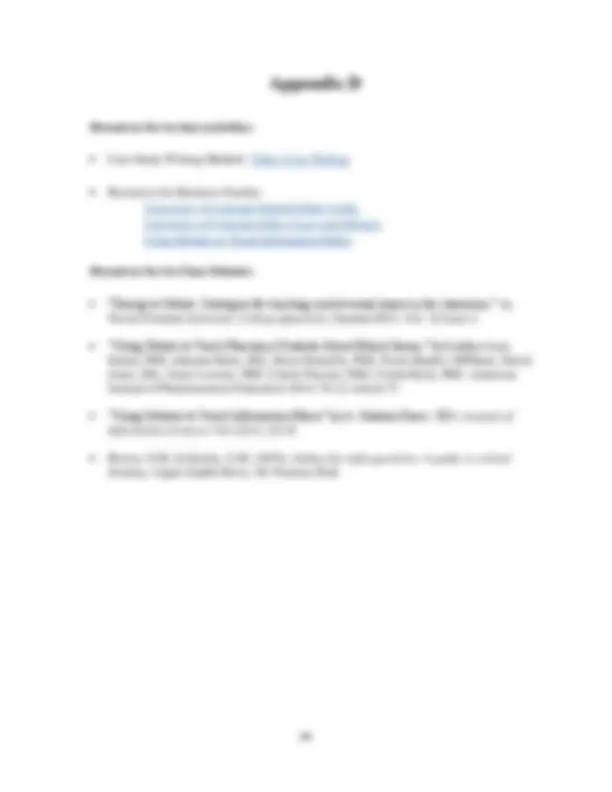
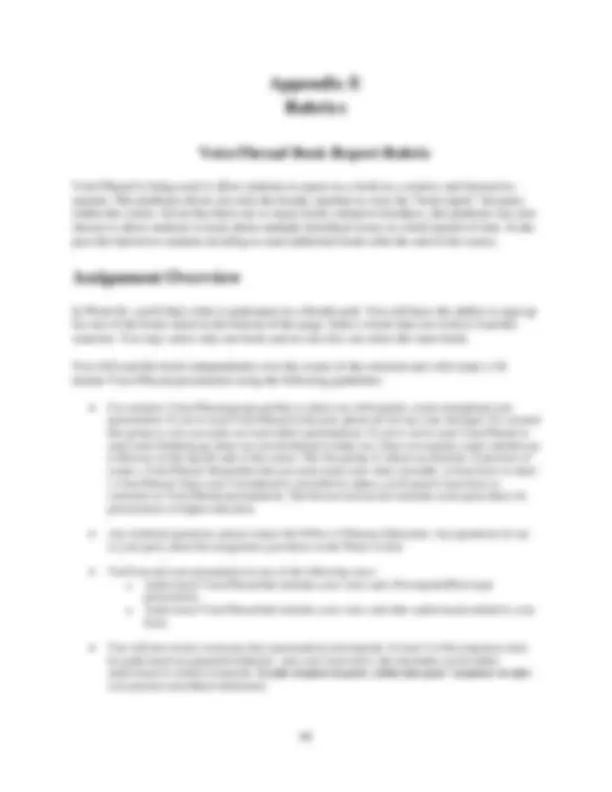
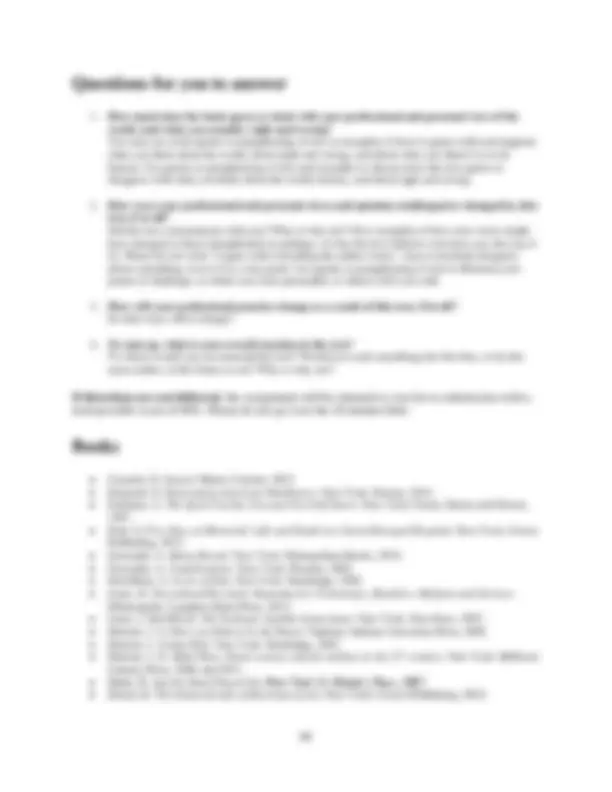
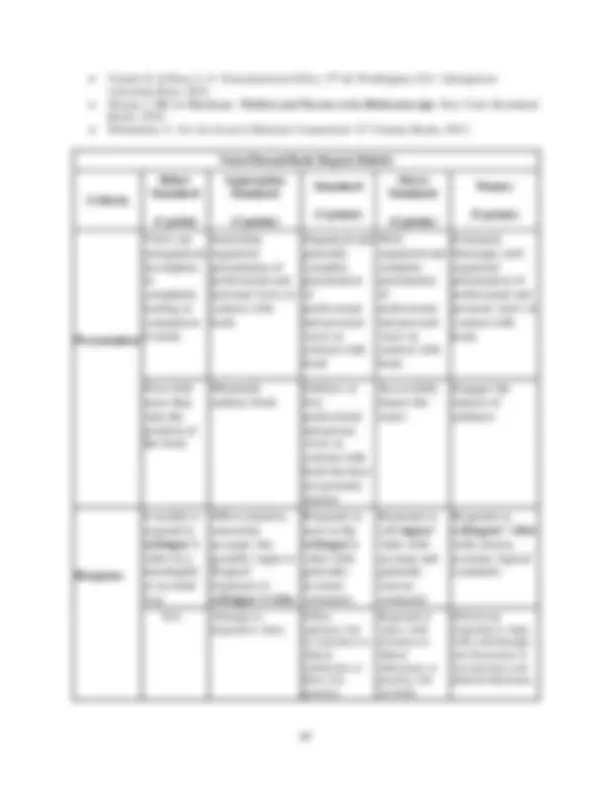
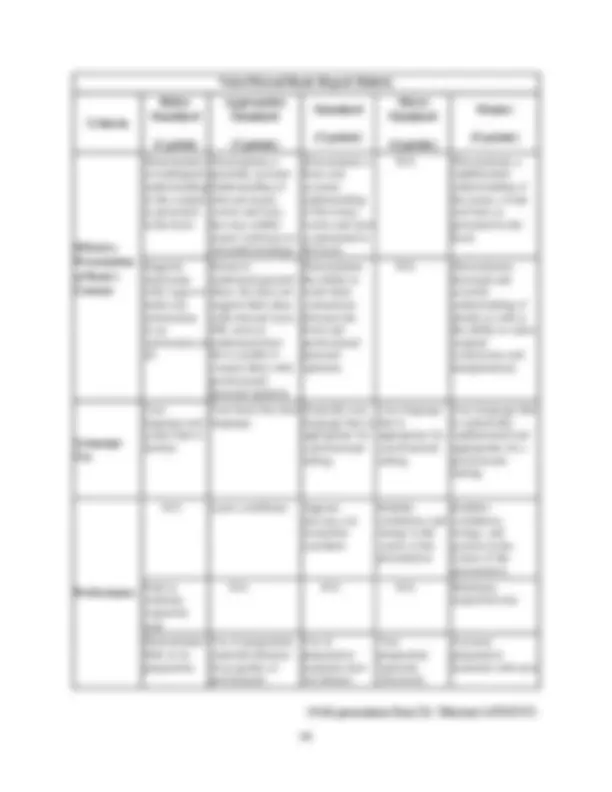
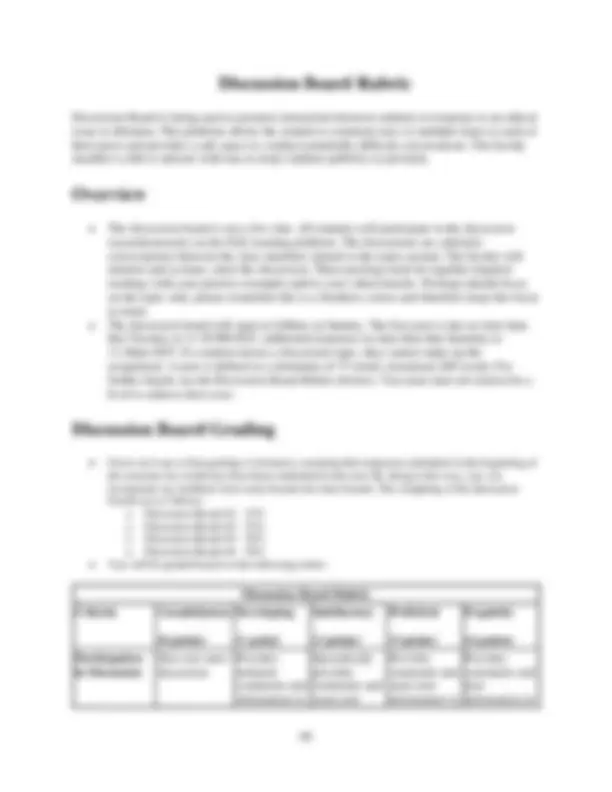
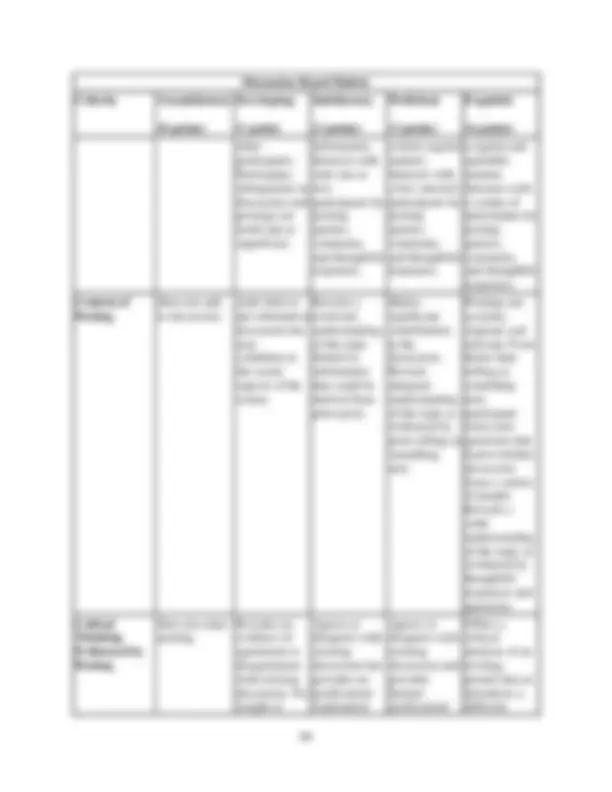
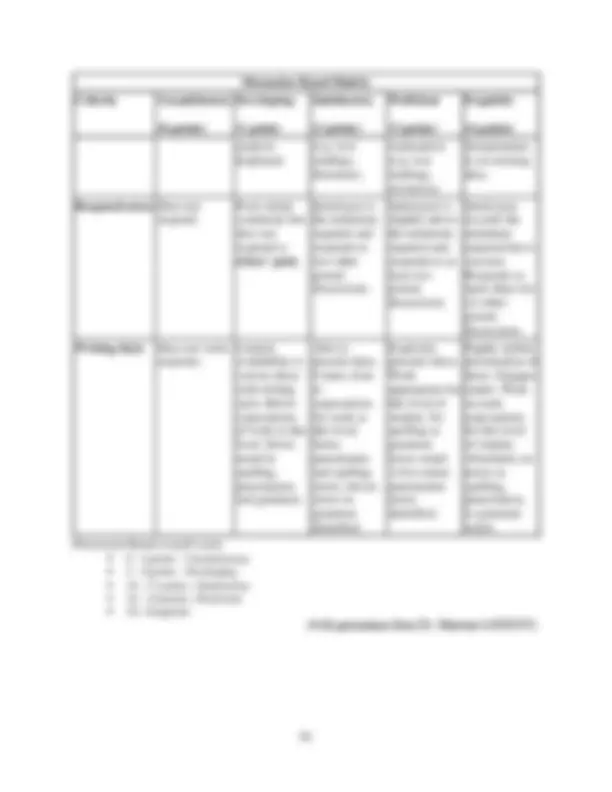
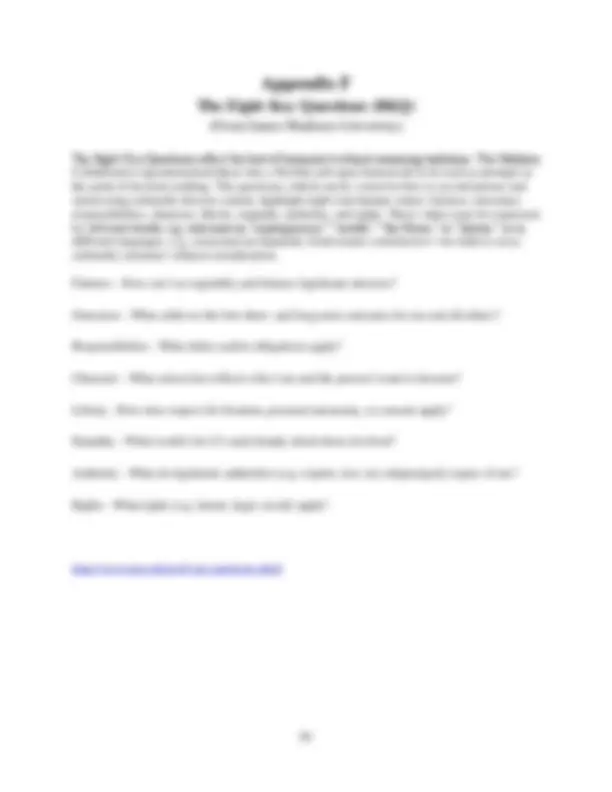
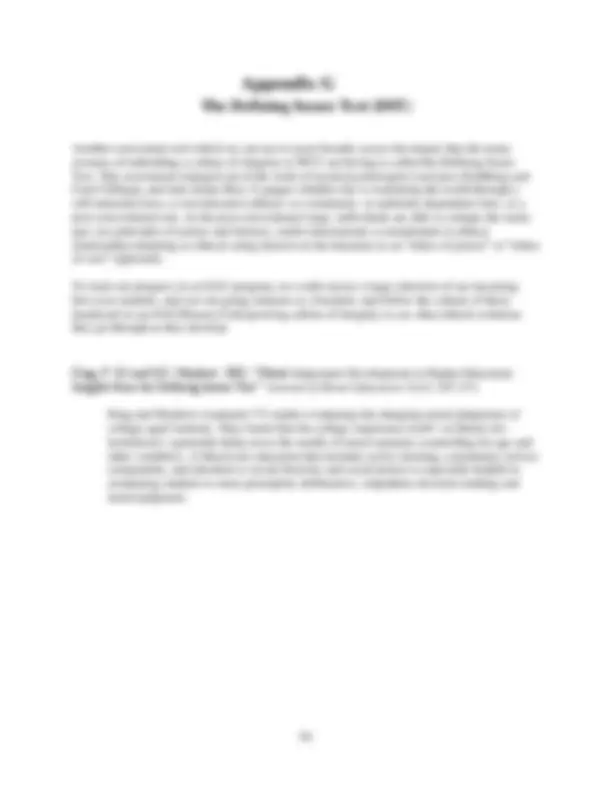


Study with the several resources on Docsity

Earn points by helping other students or get them with a premium plan


Prepare for your exams
Study with the several resources on Docsity

Earn points to download
Earn points by helping other students or get them with a premium plan
Community
Ask the community for help and clear up your study doubts
Discover the best universities in your country according to Docsity users
Free resources
Download our free guides on studying techniques, anxiety management strategies, and thesis advice from Docsity tutors
The West Chester University Ethics-Emphasis Program Handbook provides guidelines and recommendations for Ethics-Emphasis courses, as well as details on the development of Ethics Across the Curriculum programs. The handbook explains the requirements for Ethics-Emphasis courses and the basis for this initiative, and provides recommended ethics activities, as well as explanations of those activities to give interested faculty an idea of what ethics content may be used across the curriculum. It was written by the original Ethics Subcommittee members of the General Education Committee in CAPC to aid faculty members in providing common ethics-emphasis competencies in their courses, and to enhance student learning about ethics.
Typology: Study notes
1 / 53

This page cannot be seen from the preview
Don't miss anything!














































Pages
This handbook was written by the original Ethics Subcommittee members of the General Education Committee in CAPC to aid faculty members in providing common ethics-emphasis competencies in their courses, and to enhance student learning about ethics. It serves as a guide for those interested in creating Ethics-Emphasis courses, but it is by no means intended to be a replacement for attending an Ethics Workshop or Faculty Seminar at WCU. The Handbook also provides details on the development of Ethics Across the Curriculum programs--a result of National Science Foundation funding--the foundations of which include cross-curricula ethics emphasis courses. These programs address the necessity of exposing our students to ways of noticing and examining the ethical issues they will encounter in their daily lives and in their careers. In addition to explaining the requirements for Ethics-Emphasis courses and the basis for this initiative, this Handbook is also a source of ideas and models. It provides recommended ethics activities, as well as explanations of those activities to give interested faculty an idea of what ethics content may be used across the curriculum. Faculty are also encouraged to develop their own. Ethics Subcommittee August 2019 Dr. Joan Woolfrey Dr. Cheryl Monturo
It is strongly suggested that a faculty member new to teaching ethics proceed by first participating in an Ethics Workshop or Faculty Seminar held periodically at WCU. They can then begin the process of developing a new course syllabus or modifying an existing one to reflect the criteria stated in the “Criteria for Ethics Courses” (see Section III) and the “Checklist for Ethics Course Criteria” (see Appendix A). When the new syllabus is finished, it should first be submitted to the faculty member’s department for approval. After acquiring department approval, faculty should complete the necessary information in the Course Inventory Management (CIM) system including upload of the syllabus and any other required documents. The course should be designated as a full CAPC review. The application will then be electronically forwarded to the Ethics Subcommittee of CAPC and potentially other subcommittees depending on other course designations. The Ethics Subcommittee is comprised of (at least) 2 appointed faculty members with extensive knowledge in the areas of Philosophy and/or Ethics. After reviewing the application, the Ethics Subcommittee will either return the application to the applicant with questions and/or a request for revisions, or forward the application and recommendation for Ethics designation to the CAPC General Education Committee. From there, the application will go through other required Committees as per CAPC bylaws ending with CAPC Executive Board. It then will be included on the agenda for the next scheduled CAPC General Assembly. If members of CAPC approve the application, it will be forwarded to the Provost. Finally, with the Provost’s signature, the course will receive the Ethics designation as of the date specified by the Provost.
A. Criteria for the Ethics-Emphasis Designation Ethics Across the Curriculum courses at West Chester University must meet the following criteria. (Please note that although Distance Education is not inconsistent with these criteria, you must clearly demonstrate how you will meet these criteria in a distance education format.)
those, which take priority. Apply a 3 to the alternative which best reflects the values you list. Apply a 1 to that alternative which least reflects the value. (2's are for in-betweens.) Use the last row to calculate. Values // Alternatives below // to the right →
Ethics Calculation → Based on your calculation, what should be done? Defend your response here:
First, identify important stakeholders in the case of Daraprim’s price going up. Collectively, we will identify these four: pharmaceutical companies, patients, hospitals, FDA. Then, we will form 4-person groups and debate about whether it is ethical to raise the drug price. Each of you will take a role as one of the identified stakeholders. As homework, please do research on this issue. To strengthen your argument, use facts, numbers, and expert testimony; please bring one page of debate notes and turn it in after the debate; in your debate notes, please list at least 3 points that support your position. Formal writing assignment: writing debate notes. Since this note will incorporate the research students will conduct on this issue, it is a research-based report. (From Dr. Liu’s MGT313)
failed to convince you, the way it is). Please do not write "I agree with everything the author wrote," since everybody disagrees about something, even if it is a tiny point. Use quotes or paraphrasing of text to illustrate your points of challenge, or where you were persuaded, or where it left you cold.
● The discussion board is not a live chat. All students will participate in the discussion (asynchronously) on the D2L learning platform. The discussions are scholarly conversations between the class members related to the topics posted. The faculty will monitor and at times enter the discussion. These postings must address the questions posed- for example, focusing on the ethical issue of conducting a study on salt consumption in prisoners, vs the clinical issue of a high salt diet. Once addressed, the posting should then tie together required readings with potential practice examples and include your preferred ethical lens from the ELI. Postings should focus on the ethical topic only; please remember this is a bioethics course and therefore keep this focus in mind. ● The discussion board will open at 6:00am on Sunday. In order to be sure that everyone has time to have a conversation, the first post is due no later than Tuesday at 11:30 PM EST, additional responses no later than Saturday at 11:30pm EST. If a student misses the Tuesday deadline, it will be reflected in the rubric. If a student misses a discussion topic, they cannot make up the assignment. A post is defined as a minimum of 75 words; maximum 200 words. For further details see the Discussion Board Rubric (below). You must meet all criteria for a level to achieve that score. (see Appendix E for rubric) (from Dr. Monturo’s NSG537)
outlines a host of unintended and unfortunate consequences if these efforts are left uncoordinated.^6 The first unfortunate consequence is in communicating the perspective that all ethical decisions are relative and/or subjective. College students are exposed to a wide variety of values as they interact with their peers, and often this is the first time they have come to experience perspectives significantly different from their own. One frequent reaction to any conflict over values, dubbed “student relativism” by Steven Satris,^7 finds the students deferring to an unreflective “we all have different opinions.” This tendency toward ethical relativism is further supported by the implicit message that disciplines have their own codes of ethics, and even further that these fail to apply across the variety of life situations students will face. Another negative consequence that Matchett identifies is the tendency to internalize a view of ethics as dependent on an external authority, whether that is an accrediting body, a student code of conduct, or a fiat on a syllabus. This view can serve to discourage students from seeing ethical decision making as requiring their own critical reflection and examination or desiring to develop the skills necessary to do so. Finally, an uncoordinated approach to ethics can also carry with it the implicit message that ethical reflection is somehow less important than the more “objective” accomplishments available through reasoned inquiry focused on the particular “content” of a given class. In this context, ethical deliberation is often seen as “all talk” with no clear outcome and/or just a matter of personal proclivity. The growing number of colleges and universities adopting some version of Ethics Across the Curriculum comes out of a recognition of these pitfalls, and a conviction that we can do better in preparing students for ethical deliberation around the wide variety of issues they will inevitably face, and for taking their place as informed global citizens reflective about the implications of their decisions. West Chester University is well-positioned to initiate our own approach to Ethics Across the Curriculum —of which an ethics-emphasis course in every major is a solid first step. The implementation of the new general education program provides opportunities to incorporate explicit treatment of ethical deliberation in not only a single ethics-emphasis course, but also in first year experiences, capstone courses, and student’s electronic portfolios. In addition, President Fiorentino has clearly articulated ethical decision-making as an important component of a West Chester University education, and our mission statement emphasizes the need to “understand the ethical implications of decisions and the world in which [we] live.” These are important first steps for providing a path toward making Ethics Across the Curriculum a reality for our students. Implementation We’ve begun to implement very general concepts of EAC at WCU including: (^6) New Directions for Higher Education , 142, Summer 2008. (^7) Stephen Satris. 1986., "Student Relativism." Teaching Philosophy 9(3): 193-205.
(with permission from Dr. Schnell)
Science Dept.) Distance Learning Statement: Distance education uses technology to facilitate learning without the limitations of time or place. In order to capitalize on this flexibility and become a successful online learner, participants should consider the following: Self-motivation and self-discipline are critical: Students are expected to actively participate in the online classroom. They should log in daily, complete all readings, and respond fully to conference discussion topics or other assignments. All assignments must be submitted on time. Planning and organization: Online students need disciplined work habits, effective time management skills, and the ability to work both alone and collaboratively. Also, please note that the winter term takes place within a condensed format. Regular classes meet daily for 3 hours and you are expected to complete a similar workload. Communication skills: In the online environment, communication takes place through the written word. Students need strong English reading and writing skills in order to express their thoughts as they participate in discussions and other classroom assignments. Technology skills: Students are expected to be competent in the use of computers, the World Wide Web, and commonly used software programs such as the Microsoft Office Suite of applications. Students without experience using the university’s learning management system (Desire2Learn) can contact the instructor and/or the Student Help Desk to arrange instruction. Students will also be given instruction on the first day of class on how to successfully navigate and complete assignments within the Desire2Learn system. Students must have access to the most current version of Internet Explorer/Safari/Mozilla. It is expected that all students will be able to open Microsoft Office 2007 files. Students are encouraged to contact the student help desk to ensure that their computer equipment if sufficient for the D2L operating system. Students must be able to readily access the internet via cable or broadband as files may be large in this course. In this course we will be using the Desire2Learn (D2L) Learning Management System. If you are new to D2L please read the support manual explaining the various tools and functions. If you have questions about using D2L please contact the instructor or the helpdesk.
Teaching Philosophy and Goals: My goals for this course are a product of my perspective on the broader goals of higher education. Most importantly, I feel that college should be an environment that promotes intellectual development beyond the mastery of course specific content. Hence, I do not want you to merely memorize facts from the lectures, discussions or readings. My goal is for you to think deeply about how the government institutions, policies and problems we discuss impact your life and the life of others, how policymaking processes and outcomes compare to American values such as equality and liberty, how ethical reasoning contributes to civic life, and how you can act to address social and political problems. Throughout the course, I will try my best to facilitate classroom activities and discussions that will help you become engaged with the course material. However, education is a cooperative endeavor that requires you to participate actively in the learning experience. What you get out of this course will in large part be a product of what you put into it. If at any point in time you are having trouble understanding the material, please contact me. If you have interesting ideas, please share them with me. Course Ethics : You have several ethical responsibilities in this course. For this adventure to work for all of us, each of us needs to do the readings and think about them. We must respect each other’s positions on the readings, and honor intellectual experiments (the “what if….” positions); that means people should be willing and able to change their minds, to defend their positions, and challenge the positions of others. Critically, one should never confuse an argument with the person making the argument – positions are not people. This means you should not attack people, only their claims and you should do so based on reasoning. Similarly, you should defend your positions as if they were ideas to be kicked around, not children to be protected. Cheating and plagiarizing are not acceptable. They will be punished to the greatest extent permitted by West Chester University. All exams, papers, and other work products are to be completed in conformance with the WCU Code of Academic Integrity. Course Description: PSC101 is an approved Behavioral and Social Science General Education course , as well as a Diversity (J) and an Ethics Requirement (E) course. In this course we will examine American government by analyzing how historically underrepresented and marginalized groups such as women, members of the LGBTQA community, racial minorities and the poor have or have not been represented by the American political system and its institutions. In addition, the course examines how different theoretical approaches such as pluralism, elitism, socialism, liberalism and critical race theory value the concept of equality vs. individual liberty, and how social movements have contributed to social change. By focusing on elements of political culture and social experiences of these groups, we will also consider how historical and cultural contexts have shaped the differential experiences of individuals and how race, class, gender, and sexual orientation influence an individual’s role in the political system. Within this context, this course will include discussions of the U.S. Constitution in both historical and contemporary contexts, social movements, interest groups and political parties, voting patterns, the media, public opinion, the Congress, President, Supreme Court, civil rights and civil liberties, as well as economic and social policy. These materials and discussions are embedded in a political science ethics framework. This means that we will examine questions about ethical leadership, the ‘character’ of elected officials and the ‘morality’ of political decision making and resulting public policies. In order to probe the question of ethics in politics and government, the course discusses eight ethical criteria (i.e., fairness, outcomes, responsibilities, character, liberty,